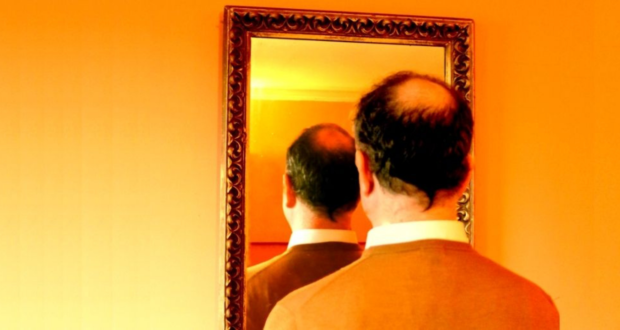A thought-provoking and intelligent show about creativity, mental health, and memory.Summary
Rating
Good
Sitting in the traditional, cosy Old Red Lion Theatre, we are thrown into an eerily intimate atmosphere by designer Tamsin Robinson’s minimalist set, which simply features a solitary chair and a man in a white straightjacket. (Ed note: the producers of the show have pointed out that the actor is not wearing a straightjacket at any time of the production, and begins on stage doing a crossword.) Simultaneously, lighting designer Jonathan Chan plunges us into the uneasy, sinister feeling a psychiatric ward might give, immersing the stage in the sort of blue light that eventually makes you feel queasy. The melancholy escalates further when the play begins with a literary punch relating to Chekhov’s first wife and The Seagull: anyone with an inkling of Chekhovian writing will be aware that what is coming will not be light-hearted. My face squirms and I enjoy that within the first few minutes I am already wondering where this cynicism will take us.
The story revolves around Anton, played brilliantly by Dan March. A famous writer, he has checked himself into a psychiatric institution called the Belvedere to get therapy for his hallucinations. But after a few weeks he seems to have become the subject of a medical study by young Dr. Defoe (Stefan Menaul). Anton is tired of being locked away, alone and, isolated with his own thoughts. He yearns for more presence in his life and mind. A mysterious visitor called Stefanie (Tracey Ann Wood) from Anton’s past appears, giving us an idea of what Anton used to be. As she creates a link between his precious past life and current fragile mind, the border between truth and imagination starts to blur, and the question of reality versus illusion becomes the main theme of the drama.
We learn how the doctor/patient relationship is in fact incredibly exploitative; that they are both effectively using each other for their own research. The relationships Ana-Marie Bamberger creates through her use of subtle language are the finest part of this play. She uses detailed and intrinsic writing to carve her way through Anton’s surreal, confused thinking. He, meanwhile, feels exploited. In one of my favourite lines he explains himself as being “paraded in front of these novices like some two-headed calf”.
At one point Anton breaks the fourth wall and gives an emotive monologue on mental health, describing the first time he hallucinated and was admitted to a ward. Two months later he had written two of his most famous novels. His lust for creativity and creation questions the connection between mental health and innovation. When Bamberger’s writing declares that “every illness is a revelation, a chance to learn something about yourself” I was acutely reminded of Lewis Carol, famously author of Alice in Wonderland and a known sufferer of neurological disorders. Anton clearly says that even if he had the choice not to he would still rather have these hallucinations. I found myself questioning, what is insanity? And do we need to brush out these corners of the mind to fully unleash our own creativity?
Director Lydia Parker has created a well-structured piece, transitioning effectively between reality and illusion in the scenes. However, the fluidity of movement could perhaps be enhanced to make the action that much more engaging and exciting: at times it became stagnant.
Minor criticisms aside, we are in a world becoming increasingly aware of mental health issues, and for that reason alone this is one to watch. Belvedere is a thought-provoking and intelligent show about creativity, mental health, and memory. It left me questioning my own reality and truth. If you feel inclined to look at the world through someone else’s eyes, I would implore you to grab a pint and enjoy this play.
Written by: Ana-Marie Bamberger
Directed by: Lydia Parker
Set and Costume Design by: Tamsin Robinson
Lighting Design by: Jonathan Chan
Sound Design by: Odinn Orn Hilmarsson
Movement direction by: Tracy Bargate
Produced by: Antonia Georgieva
Belvedere plays at The Old Red Lion Theatre until 13 November. Further information and booking via the below link.
 Everything Theatre Reviews, interviews and news for theatre lovers, London and beyond
Everything Theatre Reviews, interviews and news for theatre lovers, London and beyond



